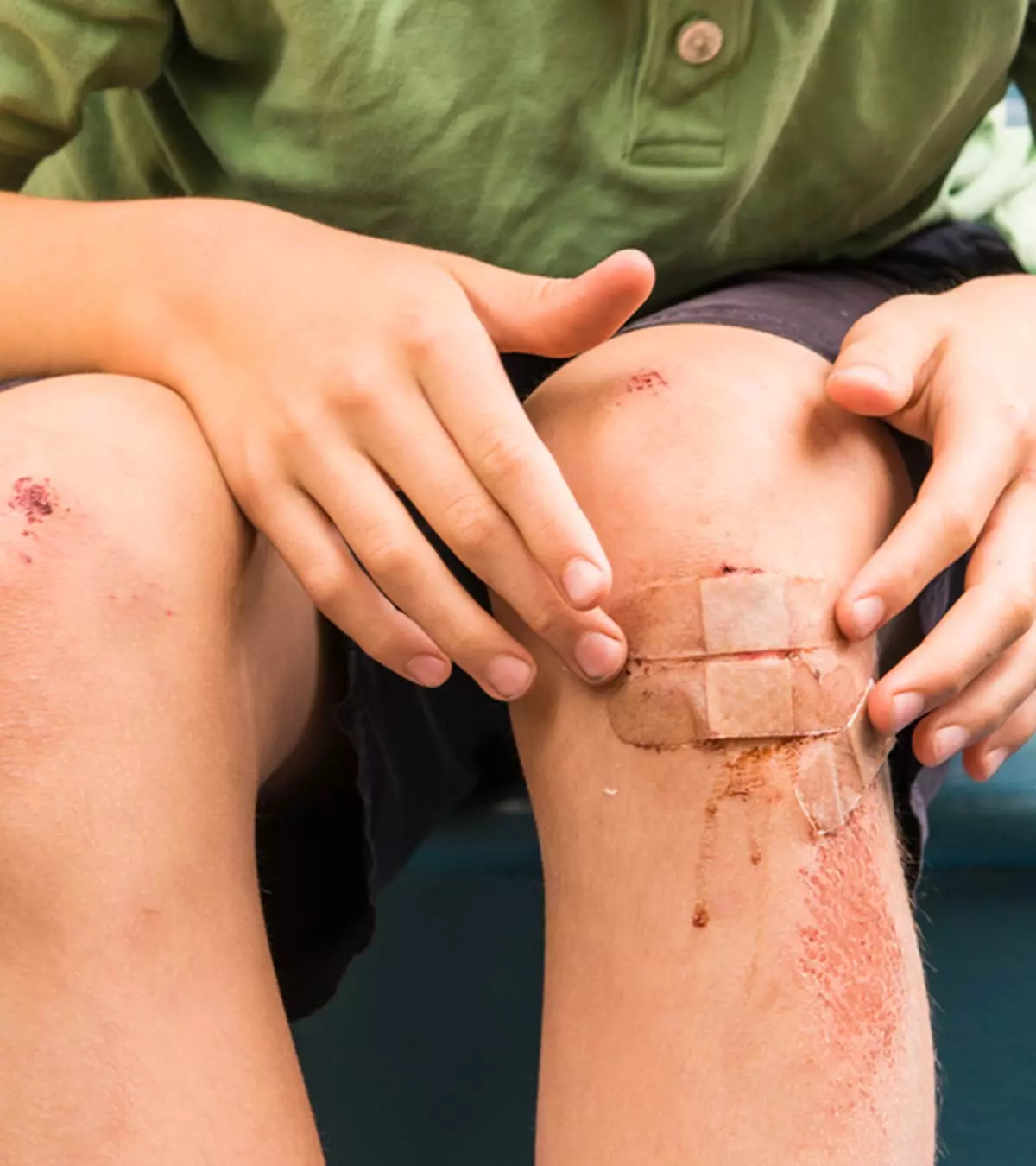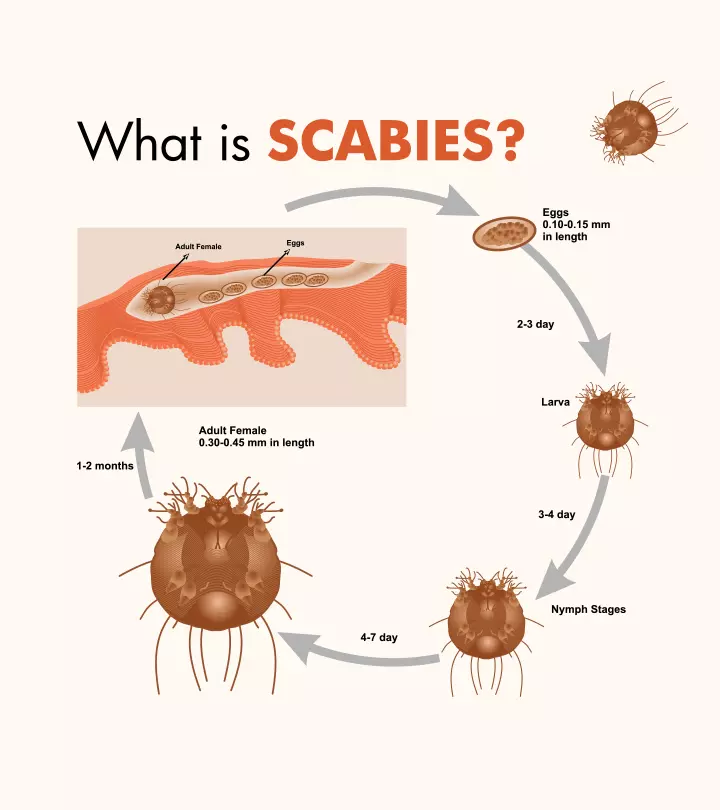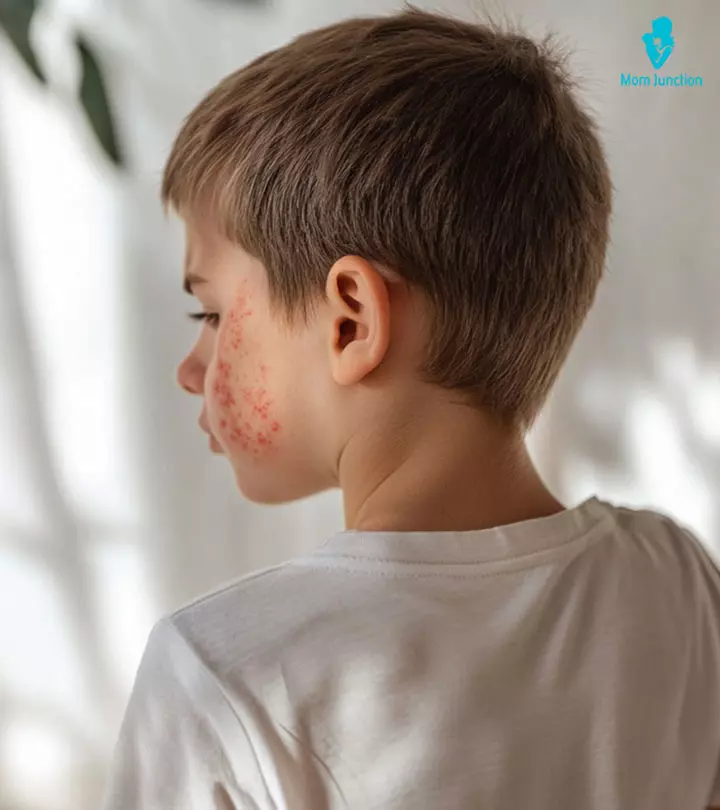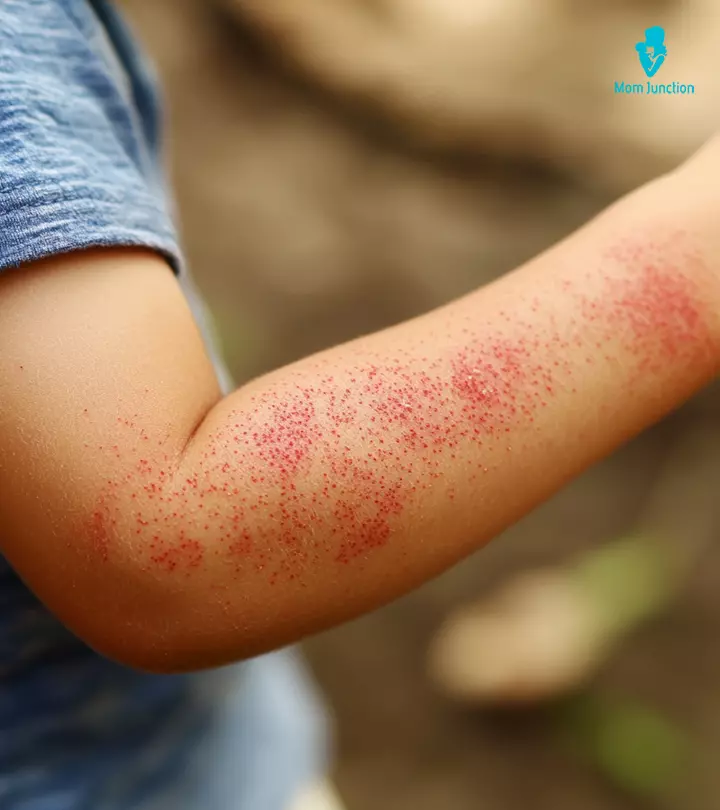
Image: ShutterStock
Vitamin B for kids is a group of essential, water-soluble vitamins that aid several physiological functions in the body.

There are a total of eight different vitamins that fall under the vitamin B complex category, namely – vitamin B1 (thiamine), vitamin B2 (riboflavin), vitamin B3 (niacin), vitamin B5 (pantothenic acid), vitamin B6 (pyridoxine), vitamin B7 (biotin), vitamin B9 (folate or folic acid), and vitamin B12 (cobalamin). Each of these vitamins performs specific functions that promote proper growth and development. Besides, they help in the overall management of your children’s health and well-being (1). Scroll down to get into the details of the different B vitamins and their functions.
Key Pointers
- Vitamin B is essential for children to carry out various physiological functions.
- The four important B vitamins for children are vitamin B1, B6, B7, and B12.
- Before giving vitamin supplements to a child, it is important to consult with a doctor.
- Some examples of foods that are rich in vitamin B include whole grains, fish, nuts, and poultry.
4 Types Of Vitamin B For Kids And Their Benefits
“Vit”-amins are “vital”! If any vitamin is deficient in the body, it can cause severe diseases. At the same time, when any particular vitamin is taken in excess, it can also result in harmful side effects. Let us understand some of the important vitamins which are vital in growing children.
1. Vitamin B1 (Thiamine):

Image: Shutterstock
Vitamin B1 is responsible for energy metabolism in your child’s body. For growing children the requirement of this vitamin ranges from 500-900 micrograms per day (2).
- This vitamin is crucial for converting sugar and other carbohydrates into energy.
- It protects the nervous system from any kind of damage or degeneration.
- And most importantly, it is necessary for passing on messages from the brain (nervous system) to different organs of the body.
Vitamin B1 for kids can be obtained from the following sources (3):
- Nuts
- Sunflower seeds
- Fish
- Beans
- Roasted Soy
- Green peas
- Wheat Bread
Remember, vitamin B1 is highly sensitive to temperature. Thus, when food is overcooked, processed or frozen, it may lose the vital B1 contents.
 Quick tip
Quick tip2. Vitamin B6 (Pyridoxine):
It is an essential vitamin and works in the overall smooth operation of the various internal body functions. For growing children, the requirement of this vitamin ranges from 0.5 -1.0 milligram per day (4).
- This vitamin plays a vital role in the proper functioning of the cardiovascular and nervous system.
- It also aids in good digestion and the immune system.
- It is necessary for proper brain function and cognitive function, and has a role in mood regulation
Vitamin B6 for kids can be obtained from the following sources (5):
- Poultry
- Beef
- Fish
- Whole grains
- Nuts and beans
- Bananas
- Potatoes
It is better to get vitamin B6 from a balanced diet. In case of external supplementation, there is a possibility that exceeding the recommended level in the body may lead to nausea, abdominal pain and neurological problems.
3. Vitamin B7 (Biotin):
This water-soluble vitamin from the B complex group is highly essential for the metabolic processes of fat and carbohydrates. The requirement of biotin for children growing up ranges from 8-25 micrograms (6).
- It can prove to be useful in Type II DiabetesiLack or rejection of insulin, thus increasing the blood glucose levels, causing fatigue, excessive urination, thirst, and hunger in controlling insulin levels.
- It is essential in maintaining healthy growth of hair and nails.

Image: Shutterstock
Vitamin B7 can be obtained from the following sources (6).
- Barley
- Corn
- Fortified foods, such as cereals
- Egg yolks
- Avocado
- Broccoli
- Cauliflower
- Cheese
- Spinach
- Mushrooms
4. Vitamin B12 (Cobalamin):

Image: Shutterstock
Vitamin B12 is essential for various metabolic processes in the body. The daily recommended intake for this vitamin is about 1.5- 2.0 micrograms (7).
- It is important for DNA synthesis and has innumerable benefits for young children.
- This vitamin also helps in production of red blood cells and maintains an efficient nervous system.
Vitamin B12 for kids can be obtained from the following sources:
- Dairy products
- Eggs
- Meat
- Poultry
- Shellfish
The deficiency of this vitamin can cause serious problems like anemiaiA condition of reduced red blood cells leading to insufficient oxygen supply and causing dizziness and breathing problems , fragile muscles, and neurological problems etc.(8). Thus a child should receive an adequate source of vitamin B12 from his diet.
 Be watchful
Be watchfulAre Vitamin Supplements Recommended?
According to the National Health and Nutrition Examination Survey 2017-2018 data, 30% of children aged between 2 and 5 years and 10% of adolescents aged between 12-19 years were reported consuming dietary supplements containing Vitamin B12. Experts advise a child should be given supplements:
- When your child is not getting the adequate vitamins from their food, then they should receive vitamin supplements in case of clinical evidence of deficiency (9).
 Point to consider
Point to consider
Image: Shutterstock
- Avoid self-medication of your child with vitamins.
- Do not change the dosage of supplements on your own. Sometimes, it is beneficial to take B complex injections to meet the body requirement of vitamins, because injections can directly pass the nutrients into the bloodstream. But this should be taken strictly under physician’s supervision
- Lastly, you should understand that nothing can replace a balanced diet and too much reliance on supplements is not good for health.
 Quick fact
Quick factFrequently Asked Questions
1. What happens if my child has too much vitamin B?
Since vitamin B is water-soluble, urine removes any excess of it from the body. However, if children are given supplementation, they may sometimes have excess vitamin B in their bodies. Excessive niacin intake may adversely affect the nervous system and blood fat, while pyridoxine may cause nerve damage. Excess folic acid may lead to irritability, malaise, and intestinal dysfunction (10).
A 2025 study on 40 children suggested that high vitamin B12 usually does not cause any issues in children. However, in some cases, it may lead to leukemia in later life (11).
2. Does vitamin B complex increase the risk of weight gain?
Yes, a 2019 study conducted on 5606 children showed that the consumption of vitamin B groups increases the risk of weight gain (12).
3. What is the best time to take vitamin B complex?
Since vitamin B is water-soluble, taking it on an empty stomach with a glass of water will help children absorb it better. Also, the best time to take it is morning as it has an energizing effect, and taking it at night may affect children’s sleep (13).
4. Does vitamin B help with anxiety?
Yes, a study by the Telethon Institute for Child Health Research indicates that vitamin B levels in children influence their mental health and overall well-being. So, a healthy diet rich in vitamin B may help them deal with their anxiety (14).
5. What should I look for when choosing a Vitamin B supplement for my child?
When choosing a Vitamin B supplement for your child, consider products that are free of artificial additives, allergens, and added sugars. Also, opt for supplements from reputable brands with transparent labeling and quality certifications. Consulting your pediatrician can help confirm if the supplement is suitable for your child’s specific needs and dietary requirements.
Vitamin B for kids is crucial for a child’s proper growth and development. Since this nutrient complex plays a vital role in many metabolic processes, you must ensure your child consumes foods rich in vitamin B. In addition, since vitamin B is a part of many common ingredients, consuming a balanced diet would help meet its recommended dietary intake. However, if you notice signs of vitamin B deficiency, consult a pediatrician and only administer supplements on their recommendation.
Infographic: Sources Of Vitamin B For Children
Vitamin B is an essential group of micronutrients responsible for physiological growth. A way to include this vital nutrient in your child’s diet is to provide them with the right combination of Vitamin B-rich foods. The infographic below presents the child-friendly food groups rich in vitamin B. Check out!
Some thing wrong with infographic shortcode. please verify shortcode syntaxIllustration: Amazing Benefits Of Vitamin B For Kids
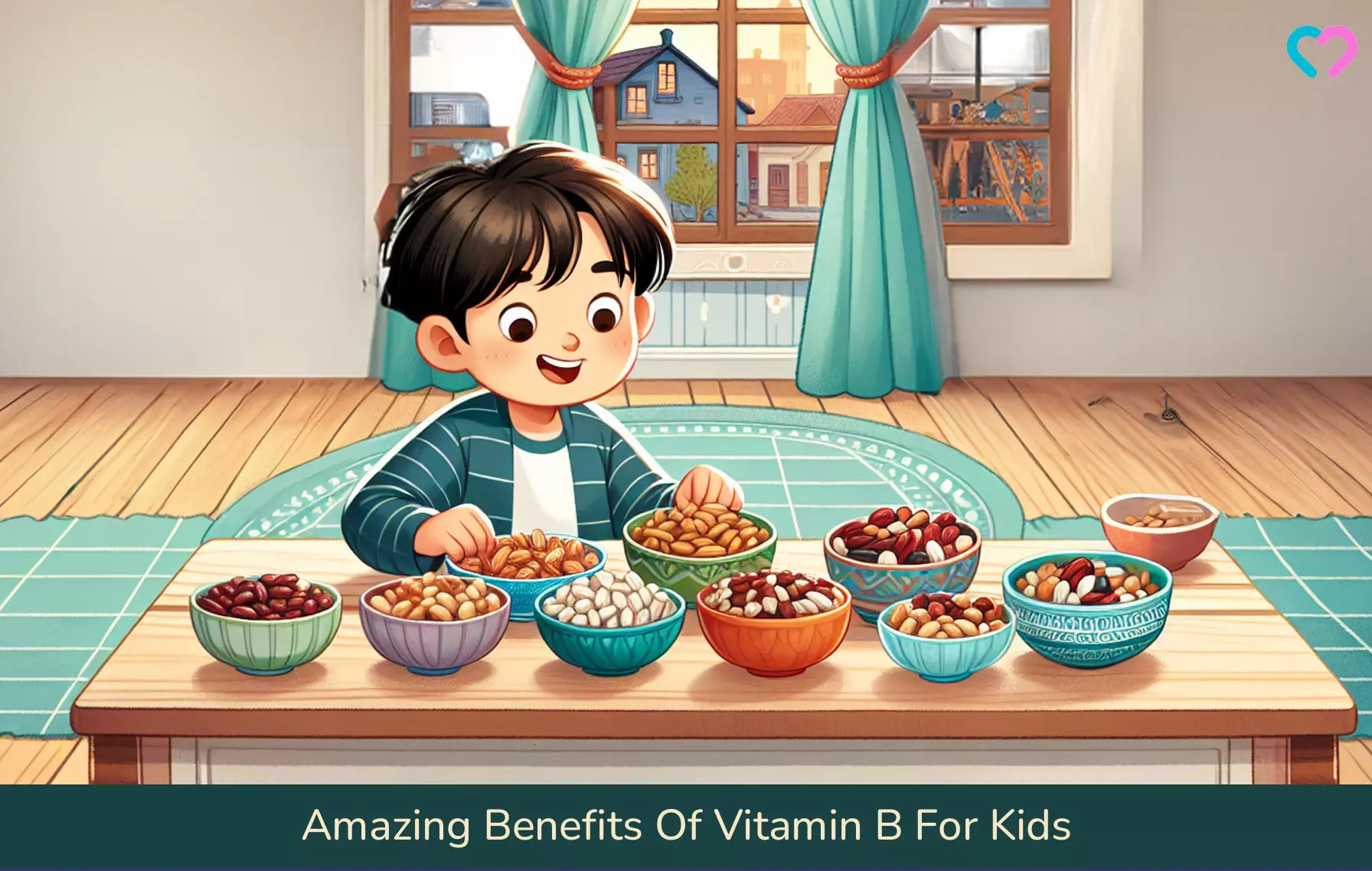
Image: Dall·E/MomJunction Design Team
Kids need Vitamin B12 for healthy growth and development. The following video demonstrates how much Vitamin B12 kids need to stay healthy.
References
- Vitamin B.
https://www.healthdirect.gov.au/vitamin-b-and-your-health - Thiamin.
https://medlineplus.gov/ency/article/002401.htm - Thiamin – Vitamin B1.
https://nutritionsource.hsph.harvard.edu/vitamin-b1/ - Vitamin B6.
https://ods.od.nih.gov/factsheets/VitaminB6-Consumer/ - Vitamin B6.
https://ods.od.nih.gov/factsheets/VitaminB6-HealthProfessional/ - Biotin.
https://ods.od.nih.gov/factsheets/Biotin-HealthProfessional/ - Vitamin B12.
https://ods.od.nih.gov/factsheets/VitaminB12-Consumer/ - Vitamin B12 Deficiency Anemia.
https://www.mottchildren.org/health-library/hw65706 - Does My Child Need A Supplement?
https://www.eatright.org/health/essential-nutrients/supplements/does-my-child-need-a-supplement - Vitamin B.
https://www.betterhealth.vic.gov.au/health/healthyliving/vitamin-b - Davut Albayrak and Canan Albayrak; (2025); Clinical follow-up of children with high vitamin B12 values: should we worry?
https://pubmed.ncbi.nlm.nih.gov/35023657/ - Roya Taleban et al.; (2019); Is dietary vitamin B intake associated with weight disorders in children and adolescents? The weight disorders survey of the CASPIAN-IV Study.
https://www.ncbi.nlm.nih.gov/pmc/articles/PMC6875549/ - The Best Time to Take Vitamins.
https://health.clevelandclinic.org/the-best-time-to-take-vitamins - Vitamin B crucial to children’s mental health.
https://www.thekids.org.au/news–events/news-and-events-nav/2012/october/vitamin-b-crucial-to-childrens-mental-health/ - Thiamin.
https://ods.od.nih.gov/factsheets/Thiamin-HealthProfessional/ - Vitamin B12.
https://ods.od.nih.gov/factsheets/VitaminB12-HealthProfessional/ - What the Color of Your Pee Says About Your Health.
https://rightasrain.uwmedicine.org/well/health/what-color-your-pee-says-about-your-health
Community Experiences
Join the conversation and become a part of our nurturing community! Share your stories, experiences, and insights to connect with fellow parents.
Read full bio of Dr. Surabhi Sangwai
Read full bio of Sindusha MS
Read full bio of Swati Patwal
Read full bio of Shinta Liz Sunny











